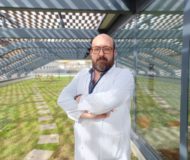

The Sant Pau Research Institute announces the creation of the new research group in Advanced Medical Imaging, Artificial Intelligence, and Image-Guided Therapy. Dr. Josep Munuera, a researcher with a broad trajectory in the use of artificial intelligence applied to medicine and director of the Radiodiagnosis Service at Hospital Sant Pau, will lead this cross-sectional and multidisciplinary project that seeks to go beyond traditional specializations.
The approach of this new group goes beyond traditional currents by integrating experts from various medical and technological disciplines, both from the research institute and the hospital. This project is structured in two main areas: the first one focuses on quantitative vascular imaging, exploring more effective methods for extracting and analyzing data. The second one is based on the use of generative artificial intelligence in radiology and medical imaging, opening up new possibilities in data analysis and transformation.
“Medical imaging is crucial in the research of virtually all medical specialties. The application of artificial intelligence will maximize the potential of data obtained through imaging tests, contributing significantly to advancing research and, therefore, improving clinical practice,” says Dr. Munuera.
The strength of this group lies precisely in its cross-sectional, heterogeneous, and multidisciplinary nature. “We invite researchers from different areas of the institute to join and create a unique collaboration environment. Although radiology and medical imaging are fundamental, we want to break down knowledge silos and foster collaboration among professionals from all specialties such as computer vision, physics, or bioengineering, as well as various medical branches, allowing for comprehensive and enriching collaboration. Medical imaging is a unique universe of data, and we want our experts to explore all its potential,” emphasizes this researcher.
In addition, the new group will not be limited to internal research but will also offer consultancy to other research groups both inside and outside the institute. “The vision is broad, ranging from the role of imaging in specific diseases to the application of artificial intelligence in surgical planning and 3D image design, diagnosis, and treatment of multiple diseases.”
Dr. Munuera explains that medical imaging is a transversal tool in the research of virtually all medical specialties, and now, the application of artificial intelligence will serve to harness the potential of the data obtained through imaging tests and achieve their maximum performance. “It is true that this group covers many areas, but it also brings the value of integrating them all for the benefit of research.”
Dr. Josep Munuera is a reference in research on artificial intelligence applied to medicine. This radiologist specialized in neuroradiology at the Hospital del Mar in 2005. He worked as an associate in neuroradiology at the Vall d’Hebron and Sant Pau Hospitals between 2005 and 2012. Subsequently, he was head of the Magnetic Resonance Unit at the Germans Trias i Pujol Hospital from 2012 to 2016; Health Director at the Institute of Diagnostic Imaging (CatSalut) from 2016 to 2017, and later, head of the Radiology Department at the Hospital Sant Joan de Déu, from 2017 to 2023. Since April 2023, he has been the Director of the Radiology Service at the Hospital de Sant Pau.
His academic and professional work has focused on the study of neuroradiology, especially in cerebrovascular diseases in adults and the innovative development of imaging biomarkers. He is the author of 85 scientific articles and 11 book chapters. He has led several national and international projects, such as the Expert3D program (EIT Health Campus for 3 consecutive years), CARONTE for cardiovascular risk assessment tools in pediatric oncology patients (Next Generation), and Vasculomics, a clinical decision support system for evaluating pediatric cerebral vascular diseases, highlighting his commitment to integrating AI and machine learning technologies in radiology to improve the accuracy and effectiveness of medical diagnoses and treatments. He currently directs the postgraduate course “Expert3D: AI and 3D in health” at the Polytechnic University of Barcelona.
With the impetus of this new research group, Sant Pau consolidates itself as a reference in the integration of artificial intelligence and medical imaging and reaffirms its commitment not only to advance research in this field but also to improve the clinical application of medical imaging.